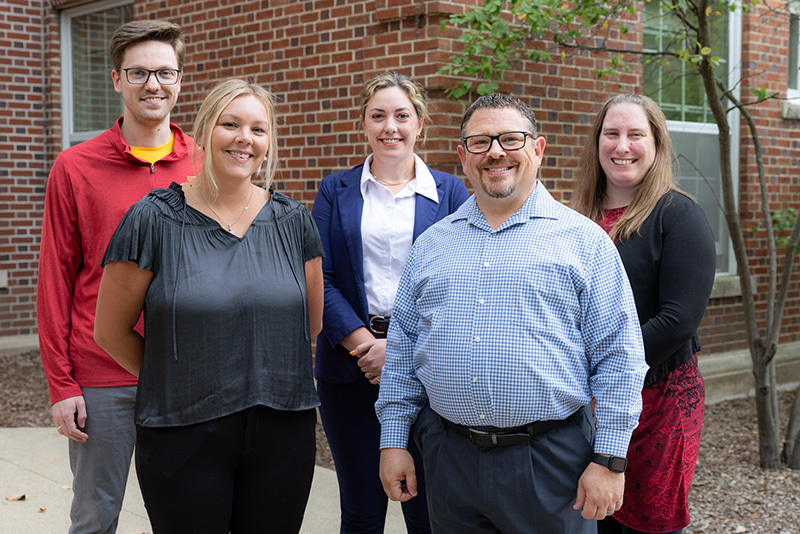
Student affairs' assessment, research and divisional effectiveness team (from left): Michael Graham, Katie Ansong, Amanda Puffett, Matt Pistilli and Liz Housholder. Photo by Christopher Gannon.
Sometimes it's best to let the data tell the story.
The office of assessment, research and divisional effectiveness in the Division of Student Affairs excels at studying data to inform decisions on university policies and programs and help students achieve their goals.
Programs within the student affairs division generate mountains of data on student activities, everything from how often students attend events at the Memorial Union or access recreational services, to how many students participate in learning communities. That data can guide improvements in those programs and services, but someone has to assess it all.
That's where Matt Pistilli and his team come in. Pistilli, the director of assessment, research and divisional effectiveness, said the office works within the division to measure and assess impacts and success for students.
"It's about making sure our efforts are centered on the student and the university mission and making sure we're investing in what works," Pistilli said. "We want to demonstrate why we do what we do, show how well we do it and inform future policy and practice. We need to be able to show our outcomes, point out how what we do drives success for students."
Pistilli was hired in August 2016 to create the position he now occupies, and the office has expanded to five employees in the years since.
Examples run the gamut for the kind of data collected by the division. Academic measures like course performance, student retention and graduation rates can factor into the office's work. Every time a student swipes their ID to access dining, recreational facilities or an event at the Memorial Union becomes a data point as well. The office also conducts its own surveys and focus groups to zero in on particular aspects of the student experience.
Focus is on division units
Headquartered in the Student Services Building, the office team primarily works with other units in the student affairs division, though Pistilli said it may be able to partner with units outside the division in special cases. Those interested in working with the office should contact him, he said.
Liz Housholder, associate director of the office, said part of its goal is to get units to ask questions they haven't before about outcomes -- and then make data-driven decisions on how to strengthen their missions. That means evaluating available data and wringing out as much insight as possible from it.
"We're always asking, 'what data do we have on hand and what more could we be asking of those data sets?'" Housholder said.
Some of the data gathered in the student affairs division is reported in public-facing documents, but Housholder said the office never publishes personal data or information that could be used to identify individuals. Data security and privacy are top priorities, she said.
Householder stressed the effectiveness of telling stories with data, illustrating how assessments can strengthen student resources. Before being moved to the office of assessment, research and divisional effectiveness in March, her position had existed in the residence department.
Data show students tend to attain better academic outcomes while living in university housing. ISU survey data showed one of the factors that encourages students to live on campus beyond their first year is a strong sense of community in their housing situation. During her time in the residence department, Housholder said the residence life team drew on the survey data to revise resident assistant activities, encouraging the residence hall RAs to meet individually with each resident and to document those interactions to foster a sense of connection and community.
"Some of the most effective ways we have of showing our impact is to combine data and storytelling to illustrate why we do what we do," Housholder said.
